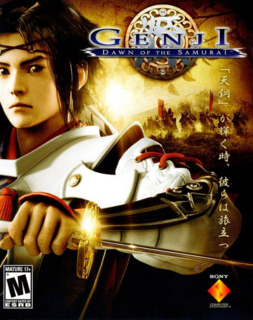Too short to be called "Day of the Samurai."
Genji is based in feudal Japan, around 1200 A.D., around a young man named Yoshisune, whose father was killed by the Heishi clan in battle. Yoshisune ends up running into a hermitage run by a monk, his daughter, and a beautiful priestess. Joining Yoshisune in battle is a seven foot tall warrior monk named Benkai, who is just a giant by any standard. Using Amahagane, jewels granting their user great power, they aim to oust the Heishi clan from Japan. Simply speaking, Genji is a tale of revenge, seen often in games.
Genji takes a pretty standard gameplay style and puts a unique spin on it, creating a game that flows. The ability to slow down time has been used in numerous games, but rarely like in Genji. The aforementioned Amahagane grants Yoshisune and Benkai the power to predict and counter enemy moves with ease, called Kamui. As Yoshisune collects Amahagne, the Kamui grows to the point when it can be used constantly, creating a super warrior. Pressing R1 activates Kamui and square initiates the attack. This simple one touch counter method makes the game simple and enjoyable. Outside of the Kamui, gameplay is slightly more complicated than hack and slash. There are normal and charge attacks that can be linked together to create combos up to ten moves. While basic at heart, the number of different combos is staggering. The combos help make this simple system look well polished and fun to play.
As Yoshisune defeats his enemies, he will gain experience and level up. As he levels up, his attack, defense, and health all rise. The changes for each level are miniscule, but over time, add up to make a huge difference. The Amahagne can be grouped into three and added to the three stats to further beef up Yoshisune. An interesting part of Genji is the weaponry. All the weapons, about fifty in all, are unique, some with elemental powers. The weapons vary in strength and size. The weapons can be on fire or even take on a demonic aura. This simple experience and weapon system, that would seem shallow on most games, combines with the Kamui system well, making Yoshisune an amazing samurai.
Replay value is something Genji sorely lacks. Genji is broken up into three chapters, with the chapters decreasing in length as the game goes on. The game takes around five hours the first time through. The story starts out like an epic story with so much potential, but cuts to the chase just as the story gets moving. Genji barely even talks about half the people it mentions in the beginning, making it feel like just a slice of the pizza. After the once through, there is a continuous mode and a difficult mode, that add little value. The continuous mode is simply a new game with the stats from the first game and the difficult mode is well, more annoying than difficult. Genji’s length begs for replays, but after two or three, not even the gameplay can save it.
Graphically, Genji is beautiful. The environments are beautifully rendered and well laid out. In no place is Genji a simple square map game. The frame rate is smooth throughout all fighting and looks silky smooth when the blades flash through the air. The cut-scenes are placed well in Genji, making them more of a treat than a hassle, and look as well as any other recent game. Musically, the soundtrack is short. It constantly loops no matter what the locale and many times just doesn’t fit. I ended up listening to my iPod as I played. The sound effects are nothing special, just simply functioning for the occasional slice, dice, and kill.
When it all boils down, Genji is nothing more than a mere rent. Genji starts out with so much potential, but ends up falling flat. The Kamui system alone is reason to rent this game, but with a five hour game, cannot justify a buy. Graphically, the game is beautiful, but after seeing the same location over and over again, gets stale. Dawn of the Samurai seems to be a great subtitle to this game, because Genji never gets past Dawn to what could have been a game of the year.
My review is also located here. http://www.epinions.com/content_199314869892
Please read my other reviews. ^_^

